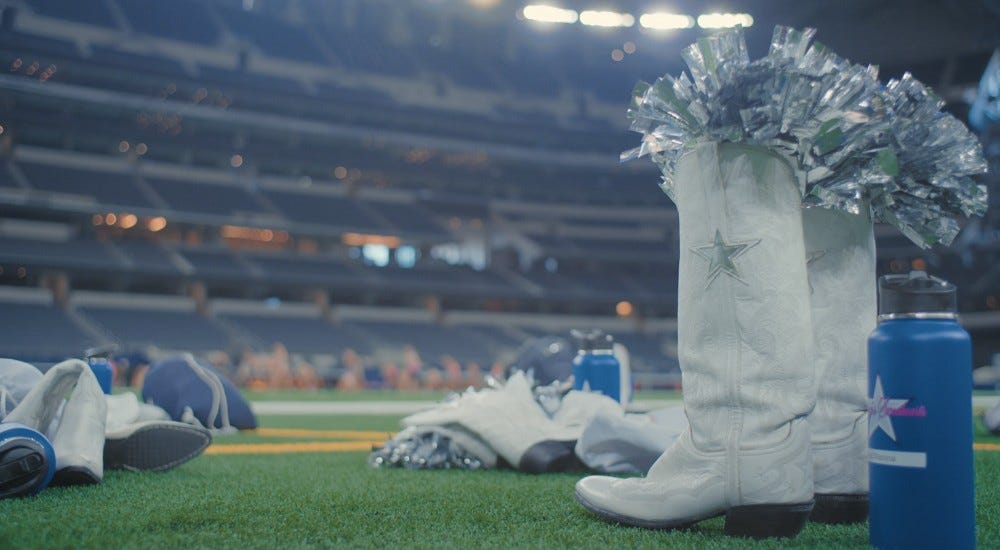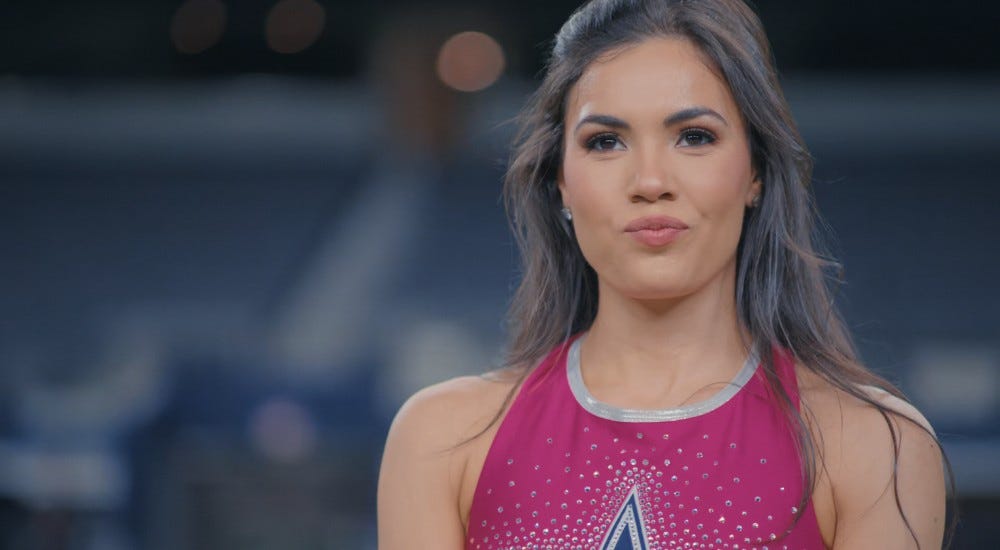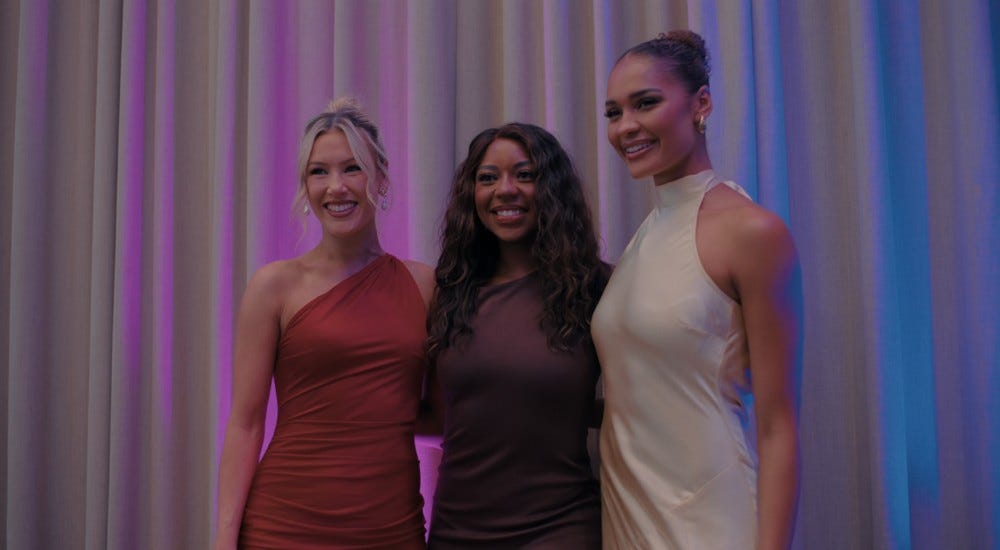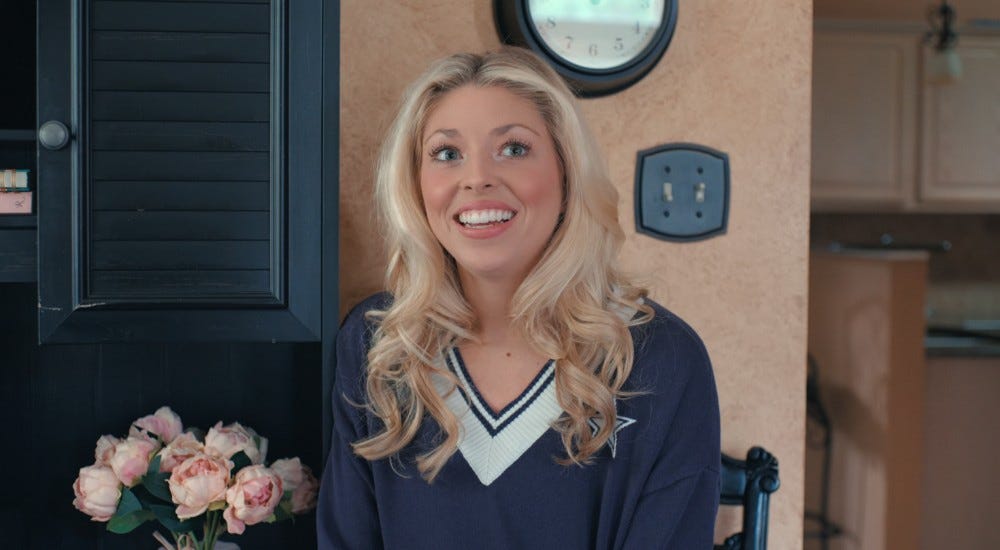“It’s An Honor To Be Here”
Season 2 of “America’s Sweethearts: Dallas Cowboys Cheerleaders” asks how much these talented women are willing to accept. *spoilers*
Thanks for reading! Please leave a like, a comment, or share this post if you enjoyed it.
Season 2 of Netflix’s America’s Sweethearts: Dallas Cowboys Cheerleaders came out last week, continuing the story of what it’s like to try out for and be a part of the most prestigious cheerleading team in the NFL. Following roughly the same formula as the first season, Director Greg Whiteley takes us through the intense process from the perspective of rookies, vets, Director Kelli Finglass and Choreographer Judy Trammell.
Where the old CMT show, DCC: Making The Team, focused on the process of simply making the team, leaving out what happens when you actually accept your perfectly tailored performance uniform, the Netflix series encompasses both training camp and the season. But because of the short run––only 7 episodes––this show ends up feeling quite lopsided, with the first four episodes including auditions and training camp, teasing cuts the whole time but only starting to showcase them in Episode 4.
Additionally, the character studies felt a bit sparse. During the first half of the season, the main characters were the new hopefuls: the OMNI Hotel girls. Young women who were recruited out of their elite collegiate dance teams, or women who had been cut last season and trained from the moment their last conversation with Kelli and Judy ended until the moment the music started for their final audition solos. It was genuinely inspiring to watch, but you lose track of them after they make the team.
Among the vets given the most air time were Jada, one of the points of the triangle and a 5th year veteran, Chandi, the other point of the triangle and a reluctant 6th year veteran, and Armani, another 5th year veteran. We follow a few other vets as well including Reece (one of the main characters from last season), Amanda, Megan and Kleine.
Overall, my feelings about this season are that the story felt very disjointed. One moment we were talking about Chandi’s experience in an abusive relationship, the next we were learning about Judy’s journey as a DCC. We were introduced to stories with only 50% of the information, and some of the most dramatic moments were thrown in at the last second. It felt like a bit of a patch job, but I watched (binged, actually) nonetheless. While the first season highlighted the reality of injury on the team, the presence of Christianity and “fueling” oneself, this season focused on a different set of realities:
The Struggle for Perfection
Episode 1 begins with a montage of both the rookie hopefuls and veterans speaking about the pressure to be perfect as a Dallas Cowboys Cheerleader. Always smile, never complain, etc. In addition, the audience is teased with snippets of later conversations the women have about the pressure to look like you’re not struggling, even if you are. For some, this pressure reaches a boiling point which leads to some bad decisions.
Of course, these expectations to appear a certain way despite how you might feel are not singular to the women on this team, but the consequences are specific, to say the least. For example, the challenges to maintain a very thin physique, while having enough strength to actually perform the routines, are not explicitly mentioned this season, despite the fact that it feels omnipresent.
One of the hopefuls this year was Dayton, a legacy of DCC (her mother Shelly was on the team for several years and is now an assistant choreographer for the team), who I had seen on the CMT show years ago, and was frankly surprised to see again. Dayton, who had been cut from training camp six years prior, was very stoic and measured this time around. She spoke in a very calm, self-assured way, and did not seem to place immense amounts of pressure on herself in the way she did before.
It was refreshing to see, until she mentioned that she struggled with an eating disorder in the past. Her body issues only started, she says, when she graduated from high school, the same time that she started thinking about DCC. The focus on one’s physique is a huge part of the team. On the CMT show, people have been cut before for gaining a bit of weight or for looking “soft,” as they like to say. If you don’t fit into your uniform, they don’t let it out, they just kick you off the team. Despite the fact that the weight gained typically does not make the women appear any bigger than a size 0 or 2.
The focus on perfection this season is very much behavioral rather than appearance-based: making sure you don’t say anything that could leave a bad taste in Kelli or Judy’s mouths; not posting on social media in a way that might hint at your immaturity; not being late; peaking at the exact right moment; etc. One wrong move, one wrong sentence, one misjudged look could be the reason you’re cut, and this knowledge stoked so much anxiety in the hopeful rookies. A group of veterans even agreed on their Refresh and Reboot retreat in the Bahamas that this class of rookies is the most stressed out they’ve ever seen.
There’s not necessarily a question placed on this reality in the show. It just is what it is. The rookies are stressed out, but they’re willing to do whatever it takes to make the team. The vets know that they weren’t going to get paid well to be on the team, but they choose to be on the team anyway. There’s so much acceptance, and very few questions.
Bills, Bills, Bills
The major storyline of this season is compensation. It’s been obvious for quite some time that according to the Dallas Cowboys, a billion dollar organization and the world’s most valuable sports franchise, that the Dallas Cowboys Cheerleaders are not worth very much at all. In the words of Charlotte Jones, Chief Brand Officer of the Cowboys and daughter of Jerry Jones, owner, president and general manager of the Cowboys, these women gain a sisterhood, find their passion and their purpose and make a difference as a DCC, so they don’t really need more money!
But since the release of the first season, the women have heard the public begging them to ask for what they’re worth, and calling out the fact that they provide so much publicity for the team without being properly compensated. Harnessing this newfound popularity, which has absolutely increased the amount of eyes on the Dallas Cowboys, a few of the women decided to fight for some positive change.
The group leaders, Jada, Armani, Megan and Chandi, meet for breakfast and discuss a plan to refuse to sign their contracts until they get fair pay for their efforts. Chandi works 4 jobs, including DCC, to make ends meet; Jada has had an eviction notice on her door during the offseason before because the supplemental income she gets during the season was the only thing keeping her afloat; the sponsor partnerships, which offset the costs of their beauty and hair maintenance don’t pay Megan’s rent; and though Armani has a salaried job, she knows that a lot of the other women on the team don’t have that security.
Interestingly enough, the only leaders who are “all in” to this plan to earn better pay are Jada, Armani and Megan. Chandi doesn’t feel comfortable making a stink.
Throughout the season, we probably see the most of Chandi. Chandi joined the team in 2019, earning her spot the first year she tried out. She had planned to leave the team last year, but had a hard time letting go of what had defined her for so long. During her sixth and final season, she landed the coveted point position and a role as a 1st group leader, a massive responsibility.
Painted as the quiet one with a painful past, Chandi can frequently be seen looking for approval from Kelli and Judy out of the corner of her eye and letting the other vets take over the more vocal aspects of leading. She wanted to focus on being a better leader this season, but ended up realizing that she’s here because she wants to dance, not because she wants to lead. This might explain her hesitancy to join the fight for better pay, even if the discomfort could positively benefit her.
From the outside in, it’s easy to wonder why someone who has made the team six years in a row would be so concerned with giving Kelli and Judy what they want, considering that she has been doing just that since they’ve met her. Chandi reminds me a lot of me actually –– regardless of evidence to the contrary, you constantly think that your success has been a fluke and the next wrong move you make could be detrimental to your position and the way people see you. I have sympathy for this position, but I’d be lying if I said I wasn’t disappointed in Chandi’s self-exclusion from such an important battle.
This is the moment where Jada starts to take the forefront. The complete opposite personality of Chandi, Jada has never had a problem speaking up for herself. So she doesn’t even hesitate to spearhead the fight for higher pay. She knows it’s not okay for people to be struggling financially as much as they are. Yes, it’s a privilege to be on the team, but it’s not fair to act as if the Cowboys gain nothing from the Cheerleaders and to use that position to justify the Cheerleaders being paid next to nothing.
“It’s an Honor to Be Here”
The trap of “it’s an honor to be here” comes up a lot this season. You know a tool for subjugation has worked when you hear it come from the mouths of those who are being exploited before those who have convinced them of the lie can even ask. It’s used as a preface to “but we deserve to be paid more.” It’s used as a way to explain away the lack of fair compensation and the financial struggles they are forced to live with. It’s used as a way to say “I just want to dance,” and be relinquished of the responsibility to fight for more.
Second year veteran Anna Kate, one of the main characters of last season, tells a teammate at dinner: “I didn’t try out thinking I’m gonna make money from this. No, I knew I was gonna have another job. I choose to have another job. And I’m doing it as something I want to do because I love to dance.” When Amanda, a third year vet, tells Kelli and Judy in a meeting that working a full time job while doing DCC is almost too much to handle, Judy tells her that that’s what makes them so impressive. When an interviewer asks two DCC, who just claimed that this is a part-time job, what their hours were last week, they do the math and answer: 40 hours. It’s giving Jordan Klepper interview levels of irony.
For sixty years, these women have not been paid what they are worth, despite the fact that they put in an abundance of time, effort and work, not to mention years of training, yet are paid as much as high schoolers at their summer jobs. It’s not as if paying 36 women a livable wage for Dallas, Texas would sink the organization. It wouldn’t make a dent. Billing wouldn’t even notice.
But the organization has made it so that the women don’t even expect any better. They are convinced that they “choose” to have another job. You don’t have a choice. You can’t survive off the seasonal, hourly pay you are given, so you have to get another job. What choice are we talking about?
This is all indicative of a larger societal problem, of course. If we keep people believing that it’s an honor to get what they are already getting, they won’t even notice when what they could be getting is paying for the CEO’s private jet. We’re convinced that things will not change, so stop trying. When the six veterans who are “all in,” meet with the Cowboys HR and legal representatives, they are not taken seriously in the slightest, only adding to the insult of not being valued for their efforts.
But when the public pressure, and perhaps a few conversations behind the scenes, puts a floodlight on the pay issue, change is finally made. Because being publicly embarrassed always changes more than being given common sense arguments in private. As of the last episode’s end-of-year DCC banquet, 3 months after the end of the 2024 season, the women’s pay has been increased 400% to nearly $75/hour!
The veterans who took a stand left the team a little bit better than they found it, despite the bugs in their ear telling them that they should just be grateful for what they have. And though Jada, Amanda and Armani, who are retiring, won’t get to reap the fruits of their labor, they feel proud that their legacy was that of positive change.
Who is Left Out?
When everyone on a team declares how much they love each other and how close the team is, I always wonder how widespread that belief is, and who is left out. Does everyone really believe that? Is everyone included? Last season, we got a glimpse of someone who did not feel included in that sentiment: Victoria. Victoria grew up living, eating and breathing DCC, as her mother Tina was a member of the team, with Kelli actually.
After trying out right out of high school, not making it and then coming back stronger than ever and staying for several years, Victoria claimed that her personality was not aligned with DCC. She had been forcing it her entire tenure because she had so desperately wanted to be a DCC; it was all she knew. We meet her again this year, finally deciding to spread her wings beyond the city limits of Dallas and moving to New York City to try out for the Rockettes.
There has clearly been a falling out between Victoria’s mom Tina and Kelli, despite how close their relationship seemed when we first met Victoria back in 2019 (on the CMT show). Kelli mentions in episode 4 that Shelly and herself have “scar tissue” from what happened with Tina and Victoria, without sharing what exactly happened. It seems to me that Tina has internalized a lot of what Victoria went through on the team, claiming that Victoria’s rookie sisters didn’t do their job in welcoming her. This probably caused a rift between Kelli and Tina, with the latter likely claiming that Kelli didn’t do a good enough job looking out for Victoria.
After Dayton’s painful cut from the team six years ago, we learn that her mom Shelly was not told directly about her daughter’s cut by Kelli or Judy. Instead she was told that she didn’t have to come into work that day. This decision deeply impacted the way she felt about the team, and she didn’t speak to anyone in the organization that she didn’t absolutely have to for a whole year afterwards.
During the Bahamas trip, when Chandi was struggling mentally, she felt she had no one to talk to, despite being with her team, so she confided in a stranger that she met on the resort and ended up inviting him back to her room. This decision violated one of the DCC rules to not give away their locations to strangers and resulted in her taking a leave of absence and her role as a group leader being taken away.
In the wake of the pay dispute and refusal to sign their contracts, veteran Amanda, one of the vets in charge of the effort, admitted that she felt her relationship with Kelli and Judy change and that she no longer feels valued in the organization. So, despite having prepped her finals solo for next year’s auditions already, she called an audible and tearfully resigned her spot.
And lastly when Chandi’s actions in the Bahamas resulted in her spot as group leader being taken away, her second group leader Kaydianna stepped up. But by the end of the season, we learn that Kaydianna has left the team as well. She felt as if “Chandi got the perks of being a first leader and [she] got the responsibility part of it.” Not to mention, when she went on TikTok live and answered a commenter’s question about Chandi and the Bahamas by saying that she’ll eventually talk about it, she received notice that she was being investigated by staff for harassment and bullying and was officially suspended.
The scant information we receive from Kelli and Judy about the above interactions leaves a lot of holes in how the organization handles complaints, and who is spearheading the consequences: the organization or the team leadership? Whose fault is it when someone like Victoria feels left out? Whose fault is it when Chandi is so desperate for someone to talk to that she turns to a complete stranger? Whose fault is it that Amanda’s experience as a vet who took a stand is so different from the other vets that did the same? Whose fault is it that Kaydianna felt so unsupported when thrown into a position of responsibility so late in the season?
I’m so curious to know what makes a person successful as a DCC beyond their dancing ability. Does it go smoother if you’re religious? If you’re white? If you’re Black? If you have a boyfriend? If you make your whole life DCC? If you’re from the South? If you’re outgoing? And how can the organization make it easier to integrate if you’re not one of those things? And most importantly: are they even interested in that?









I really enjoyed your breakdown of these points! I really enjoy watching the show but definitely notice so many dark undertones that feel very indicative of the values of America as a whole